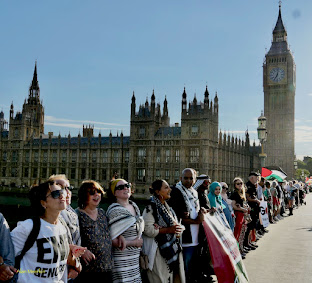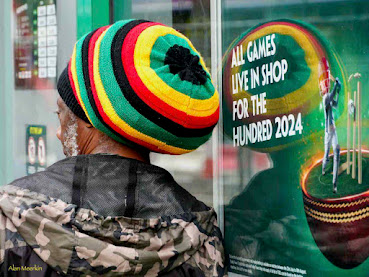This blog post has been a long time coming.
After an extended period in New York visiting enterprises supporting Israel and absorbing the current feeling in the Jewish communities there, I continued on to the UK. Every night since then, while dozing in bed after lights out, I have drafted anecdotes in my mind for posting that would explain the view from here. But I have repeatedly put off posting. And with the world changing so rapidly, my anecdotes lose their poignancy by the time I wake next morning.
Last week, Hamas chief Israel Haniya was assassinated, and Iran announced it will exact painful retribution on Israel.
Loyalty to a Cause
Unlike on previous trips abroad, I am following Israeli media instead of local news services. But I also get out to observe the goings on around me. In England, pro-Palestine protests I attended had lost some steam. Many outspoken protesters – woke students who are too lazy to check information beyond social media posts – abandoned their favourite humanitarian cause du jour in favour of a summer traveling the continent. Protests are often like a day at the circus. Hundreds of cool kids and aging hippies, dressed in Kefiyas and tattoos, many adorning watermelon earrings that represent the colours of the flag of Palestine, scream tropes across the road at a dozen pro-Israel counter-protesters stationed opposite, who hold Israeli flags and shout platitudes back at them.
No-one’s listening.
Columns of police stand between them, trying to appear detached and ominous, succeeding at neither. At 5pm everyone goes home, having scratched their itch to ‘do the right thing for humanity’ by taking a political stance.
The Future of England
Some Jewish friends from London tell me privately that they think the golden era of British Jewry is winding down. A new left wing government has been elected, having purportedly purged its blatantly anti-semitic tone. Despite this, five independent candidates were elected primarily on their pro-Palestine stance. When the results were announced, one of them, Shockat Adam, held aloft up a keffiah and proudly called out, “This is for Gaza!”. In Leeds, Mohammad Mothin did something similar. On visiting his constituency of Harehills, I was astounded to see the Palestine flag flying aloft on the municipal building.

It’s not so comfortable to be openly Jewish here. A couple of people told me that at work they hide their Star of David necklaces and other symbols of their Judaism. Moving to Israel is becoming a genuine consideration.
Others believe this viewpoint is excessive, and the world is going through a rough patch.
And then there are the universalists, who are watching the social disarray around them and fear for the continued existence of western values in this great country.
Protests
In Leeds, riots have broken out against the police on a few occasions. These have nothing to do with Israel, but it reveals a form of an increasingly common form of expression that is anathema to western liberal values.
Protests against Israel have certainly been violent. The one I witnessed a couple of weeks ago was muted as many of the regulars were either on summer vacation, or had been bussed down to a larger event in London. Jewish acquaintances regularly follow on, as masked faces holding green and red flags march through town. The former use their phones to film the protestors for evidence in the event of violence or infractions against the law. This material has led to the prosecution of anti-zionist ill-wishers.
A student chaplain in Leeds, originally from Israel, was called back home for reserve duty in Gaza. On returning to the UK, he was branded by university students as a dangerous murderer. Protestors, at the weekly pro-Palestine ‘circus’, held banners disclosing his identity, slanderously proclaiming that he is armed and dangerous and should not be approached without a weapon. Death threats began rolling in and, soon enough, 24 hour police protection was needed. Left no choice, the young man took his family and fled back to Israel. After the inciteful banners against him were filmed, a prosecution was made.
I attended one of the protests in Leeds to test the mood. As with other protests I’ve seen, the supporters chanted slogans based on facts that can genuinely be called fake news. Nonetheless, the sense of alarm and urgency of the chants, not the veracity, is the motivating factor for these marches.
I spent an hour photographing the event, and at some point told a policewoman that I appreciated her efforts in protecting everyone that day. In Australia I learned that is the done thing; unlike anti Israel agitators, Jews thank the police for their services. The policewoman responded perfunctorily.
“Of course. You’re entitled to protest, aren’t you.” I looked at her with a smile.
“Oh, I’m not protesting. I’m Israeli. A few weeks ago I was in a bomb shelter hiding from Hamas missiles. I’m here to watch and learn. But I appreciate your efforts keeping everyone safe.”
“Just you stay safe”, she responded, before racing off to keep up with the marchers.
I continued taking photos, and those in the march were happy for me to point my camera at them, presumably to give them and their cause exposure.
Soon enough, I felt a tap on my shoulder. An acquaintance with whom I had come motioned for me to leave the crowd. I followed him to a side street.
“The cops are after you. Get out of here.” We hurried off. Apparently the polite policewoman had marked me as a troublemaker, traced me to my friends, and questioned them. I had done nothing wrong, of course, and could easily show my credentials as a street photographer. Nonetheless, I was warned that the police can change their tone quickly, and their sympathies might not be aligned with mine. I have no complaints about the constabulary. I think they were just doing their job. But we made ourselves scarce and spent the day joking that I was a fugitive from the law.
That week I gave another public talk and presentation on the ‘Nuances of Life During Conflict’. Photos I took at the march made their way into my presentation and added to other stories I shared, bringing a home-grown reality to my audience.
A community leader told me, over a coffee, that while non-political activities by the Jewish communities (such as rallies against anti-semitism) are palatable, they should not be pro-zionist. Unfortunately, some people come and unfurl an Israeli flag. The distinction between Jewish and Israeli is very strongly emphasized.
Immigrant City
Later, I joined another street photographer on a jaunt in the nearby city of Bradford. A once wealthy mill town as evidenced by its stunning architecture, is now a residence for Middle-Eastern and Asian immigrants. The dissonance between the stylised, monolithic Victorian buildings and their 21st century inhabitants was striking.
We strolled the streets with our cameras. Hijabs, saris and gowns, caftans and knitted Rastafarian hats, the pungent smell of ganja and curry, all surrounded us. Scantily clad, pale teenage girls with all manner of piercings, and heavily tattooed adults, contrasted with dark dreadlocked men walking their small children through the city square.
It was a street photographers’ paradise. Being gregarious, I spoke to many of my subjects. Everyone was friendly and, hearing my accent, they often asked where in South Africa I was from. Their surprise at my accent being Australian was only superseded by the revelation that I live in Jerusalem. Israel is a contentious topic, so I prefer initially to say I’m from Jerusalem. One student, from Qatar, looked at me in confusion.
“You know Jerusalem; Al Quds” I clarified for him.
Another local, with Pakistani heritage, had loads of questions for me.
“I’d love to visit Jerusalem some time. Can you tell me about the wall? Where the Jews pray?” The young bearded fellow had a thick accent despite being born and bred in the UK. He asked me about how dangerous it is in Israel. I tried to explain in terms he might understand.
“You know how you see news reports about Pakistan and half the stuff isn’t true? Well it’s the same for Israel.” He smiled knowingly.
“Shukran, Ya Habub”, I wished him when we parted.
“What does that mean?”, he asked, explaining that, being a Pakistani Muslim, he doesn’t speak Arabic. He would run it past his Arabic wife.
Driving back to Leeds, we passed neighbourhood shopfronts adorned with Islamic signs: ‘Ahmad Shwarma’, ‘Brides by Noor’, ‘Safa Islamic Lifestyle’, and more. Free Palestine posters littered the walls, but far fewer than I expected.
Tension Under the Threat of Fire
In the evening, I spoke with family and friends back home. This week, in the shadow of Haniyehs death, Israelis are living a double life, going about their daily business and making plans that may be interrupted at any minute by Iranian allied attacks. Close friends in Tel Aviv went for a walk on the beach to let off steam in the summer heat wave. One of our group, a therapist, didn’t join them.
“I can’t do it Alan. I can’t go out into the open and be far from a shelter, exposed.”
Her feelings are totally understandable, especially in the wake of 12 Druze-Israeli children who died two weeks ago playing football, when a Hezbolla missile struck them in their village of Madjdal Shams.
“How are you dealing with the stress?” I asked my friend. She paused.
“I never managed to disconnect like other Israelis. As a therapist I help lots of people who are suffering from the stress these days. I advise them to give meaning to everything they do. And I am trying to do the same. It gives me the motivation to get on with things.”
Some friends are traveling overseas. Others are stranded abroad, as numerous airlines cancelled their flights to Tel Aviv in fear of the turmoil threatened by Iran. Israelis have been advised to make their way to Greece and Cyprus to which Israeli airliners are putting on extra flights to bring people home. Prices on these flights have been capped to prevent gouging. But with a flood of Israelis trying to get to these departure points, connections from other countries have skyrocketed.
A visitor I am expecting next month from Australia called me in a panic. She booked her flights to Israel six months ago, and now everyone is telling her to cancel.
“A month is a long time in the Middle East,” I replied. “Wait and see. No-one knows anything. Except Iran, of course. And possibly not even them. We’re all potential targets, wherever we are in the world.”
I was not telling her anything new, but hearing a calm voice always helps. As long as we stick together, take every day as it comes, and speak in a calm voice, we will get through the current uncertainty.



















